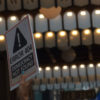For scholars conducting international research—archival, anthropological, data-driven, and all points in between—certain tools can be essential to the process. In this miniseries, SSRC staff caught up with eight current or former SSRC fellows to get a glimpse inside their research bags and to hear their best tips for conducting research. Here, 2014 Abe Fellowship recipient Dai Yamamoto and 2016 Next Generation Social Sciences in Africa Fellowship recipient Marion Ouma offer their points of view.
 Dai Yamamoto
Dai Yamamoto
2016 Abe Fellow
Associate Professor of Geography and Asian Studies, Director of the Asian Studies Program
Colgate University
Much of my recent fieldwork has been taking place in communities in the United States and Japan that host or once hosted a nuclear power plant. I am particularly interested in how people and communities are coping with such controversial facilities, or with the loss of a nuclear power plant, which often results in significant negative fiscal effects, potential population loss, and challenges with (re)using the land.

My fieldwork involves site visits, interviews, and some light archival work. Business cards are absolutely essential during fieldwork, especially in Japan. The most appropriate way to give someone your card is to hold it with both hands when you are passing it to them (there are many more fine rules, which you can find online). I tape collected business cards on a notebook or store them in card folders. They help me remember whom I met as well as the general sequence of my encounters in the field. I use a Livescribe pen, which enables me to write notes while audio-recording conversations. The beauty of this smart pen is that the positioning of my notes on the special-paper notebook is synced with the timing of the audio, and if I touch a particular part of the text with the pen, I can listen to what was recorded when the text was written down. There are similar products on the market, but this one works the best for my purposes (though still not perfectly). I also carry a regular digital voice recorder as a backup. You really cannot recover lost conversations. Whenever possible, I take a couple of photos of my interviewees, with their permission, of course; they are solely for me to remember them. Finally, I use my iPad as a quick scanner when I find reports and documents that I cannot check out.
 Marion Ouma
Marion Ouma
2016 and 2017 Next Generation Social Sciences in Africa Fellow
PhD Candidate, Sociology
University of South Africa
My fieldwork involves interviews with policymakers, most of whom are based in Nairobi, Kenya. Most important is to take into consideration juggling between dressing professionally and the practicalities of getting around the city. Weather in Nairobi is generally pleasant, but it can change from hot in the early afternoon to a mighty downpour in the evening. In addition to the weather, I need to take into consideration the insane city traffic jams. I often have to avoid the public buses, matatu, and hop on a motorbike, boda boda, to weave through traffic.

The contents of my bag therefore reflect these considerations. In case of weather change I take an umbrella—both for the heat and the rain. My Maasai sandals, though not appropriate for the rain, are ideal for walking across the city and offer relief from the “formal pumps” I sometimes need to wear to interviews. The sundry items in my bag include hand lotion, lip balm, hand tissue, and chewing gum—gum keeps me busy between interviews and keeps me from yawning when I haven’t had lunch. The water bottle comes handy when it is hot and I need to cool down.
Most important are my voice recorder and “Everything Notebook.” I write everything that I need in the Everything Notebook (I am old school). Interviews, notes, reminders, field reflections, appointments, things to do, shopping lists—everything. This helps me keep track of all of my information in a single notebook. I take my iPhone and charger—for pictures, to keep in contact, and to stay up to date on Twitter. I carry my iPad (used to take this picture) and glasses for reading in case a meeting starts late or when I have time in between interviews. And of course, I take a couple of pens for writing… in my Everything Notebook.
I carry a backpack so I can pack many items. In addition, it comfortably balances on my back when I am seated on the boda boda.
Tips for fieldwork:
- Think practically—be prepared if you need to walk for long and for changes in weather. Wear what is comfortable—both shoes and clothing.
- Carry extra supplies—extra pens, extra batteries, an extra recording device—items may fail or refuse to work and you may need a backup.













